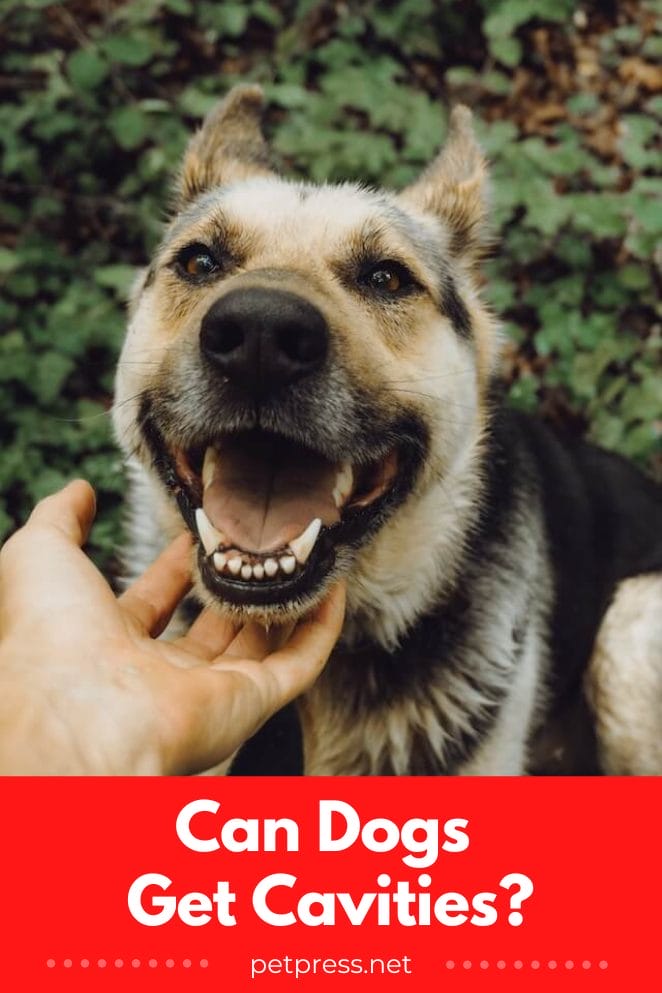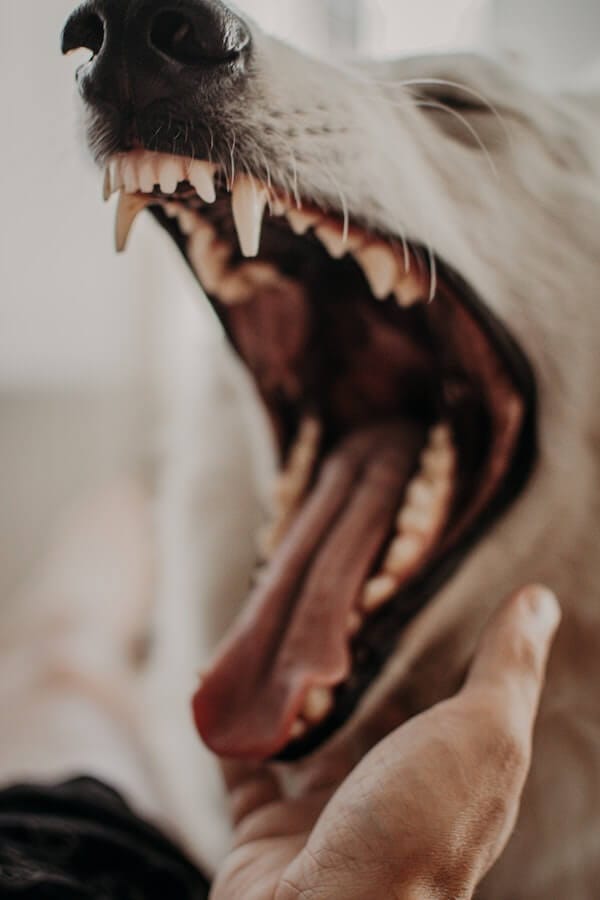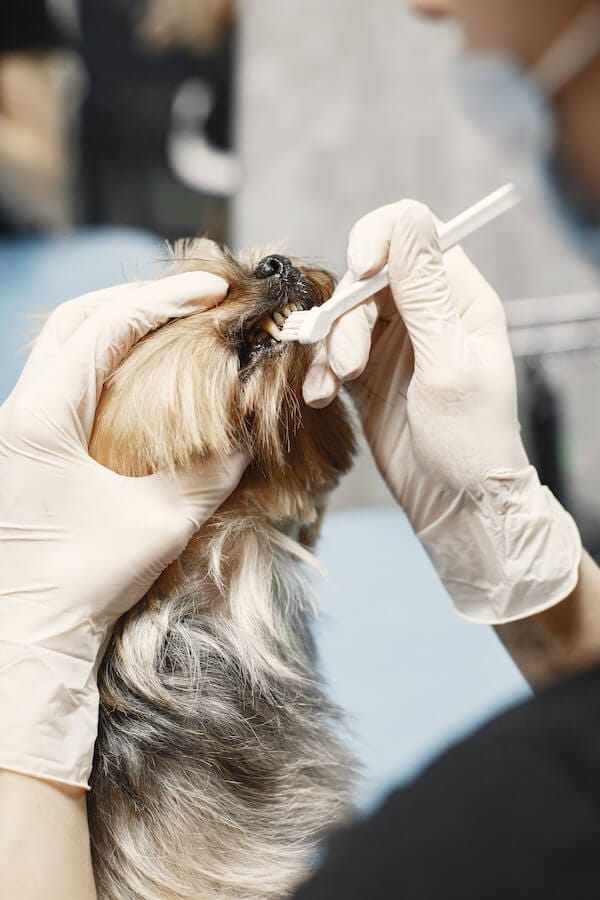
Can dogs get cavities? Unfortunately, the answer is yes.
That’s right – those same pearly whites that your pup flashes at you whenever they’re begging for food are susceptible to the same dental problems that we humans can get.
From minor plaque buildup to cavities and gum disease, there is a whole world of oral health issues out there for our furry friends.
In this article, we’ll be discussing how dogs can get cavities and what you can do to help keep your pup’s teeth healthy.
So get ready to learn about all the ins and outs of doggie dental hygiene.
Can dogs get cavities?
It’s not just humans who are prone to cavities, dogs can suffer from them too! But why?
The scientific reason why dogs get cavities is related to their diet.
Much like humans, when dogs eat sugary foods, these sugars come into contact with plaque that has built up on the surface of their teeth.
The bacteria in the plaque convert these sugars into acids which then attack and weaken tooth enamel.
This acid-producing process leaves teeth vulnerable to decay and ultimately leads to cavities forming if left untreated.
In addition to dietary factors, poor dental hygiene also increases a dog’s risk of developing cavities.
When plaque isn’t removed regularly through brushing or professional cleaning, it builds up on teeth and causes cavities to form.
How do I know if my dog has a cavity?

There are a few tell-tale signs of a cavity in dogs that you should be on the lookout for.
1. Bad breath
If your pup has an unusually bad smell coming from their mouth, it could be a sign of a cavity. This is because bacteria builds up in decaying teeth and can cause a foul odor to linger.
2. Discoloration of the teeth
Stained or discolored teeth may indicate that your pet has cavities. The discoloration occurs when plaque and tartar buildup around the gumline causing staining on the surface of the tooth.
3. Irritability
Cavities can cause extreme discomfort for your dog due to nerve damage, so if you notice that your pup is more irritable than usual, it could be a sign of serious tooth decay and should be checked out immediately.
4. Swelling around the mouth
If your pup is in pain from a cavity, you may also notice swelling around their mouth or face. This can be very uncomfortable for them and should be addressed as soon as possible.
5. Loose teeth
Loose or wobbly teeth are an obvious sign of tooth decay, so if this happens to your furry friend, it’s time to make an appointment with the vet right away!
If any of these signs appear, don’t wait to take your pup to the vet! Cavities can cause long-term damage to your pet’s teeth and gums if left untreated, so get them checked out as soon as possible.
What food causes cavities in dogs?

The main cause of cavities in dogs is poor dental hygiene. However, there are certain foods that can contribute to the problem as well. Here is a list of 5 food and food habits that may cause cavities in dogs:
1. Sugary human snacks:
Much like humans, dogs can develop cavities when they are fed sugary snacks like cookies, ice cream, and candy.
Not only do these foods contain sugar which interacts with bacteria in the mouth to form acid that erodes tooth enamel, but they also often stick to teeth and gums promoting plaque buildup.
2. Starchy processed treats:
Though not as sugary as human snacks, processed treats such as kibble have a high starch content that can interact with bacteria in the dog’s mouth just the same way sugar does.
The starch can get stuck between teeth and promote plaque buildup if not removed by brushing or chews.
3. Sticky treats:
Anything sticky such as peanut butter and cheese sticks can be dangerous for your pup’s dental health.
They stick to the teeth and increase the risk of plaque and tartar buildup, leading to cavities over time.
4. Dry food:
While dry foods don’t typically have the same sugar content as human snacks, they do tend to stick around in the mouth much longer than wet food as they are comparatively harder to break down and digest.
This prolonged exposure causes more plaque buildup which can lead to cavities if not managed properly.
The same goes for dry kibble. Although dry kibble helps clean your pet’s teeth by scraping away plaque, it can also contribute to cavities if left on the teeth for too long
5. Leftovers:
Though dogs may love the occasional morsel of human food, those leftovers can have a negative impact on their dental health.
Again, the sugar content and tendency for food to stick in their mouths promote plaque buildup which is detrimental to keeping teeth healthy.
By being mindful of what you feed your pup, you can help reduce their risk of developing cavities in the future.
How to prevent dog cavities

You can follow these five tips to keep your pup’s pearly whites in top shape!
1. Brush your pup’s teeth regularly with a pet-safe toothbrush and toothpaste. Brushing daily is preferred, but two to three times per week will do the trick!
2. Include dental chews and treats in your pup’s diet! Dental chews are formulated with components that help break down plaque and tartar buildup on their teeth.
3. Feed your pup healthy, balanced meals – ingredients like vitamins A and C, omega-3 fatty acids, zinc, magnesium, and calcium can all help prevent cavities.
4. Get regular professional cleanings at the vet – just like humans need to see their dentist every now and then! Regular cleanings can get rid of harmful bacteria before it becomes a problem.
5. Monitor what your pup is eating – grazing on grass or other objects can be harmful to their teeth and cause cavities. Keep an eye out for anything that could lead to dental problems.
Final Thoughts
The bottom line is: Dogs can get cavities! Just like humans, they’re vulnerable to bad oral hygiene, a poor diet, or both.
To help protect your pup’s pearly whites from decay, make sure you brush their teeth regularly and provide them with dental checkups at least once a year. Your furry friend will thank you for it!
Happy brushing! 🙂


GIPHY App Key not set. Please check settings